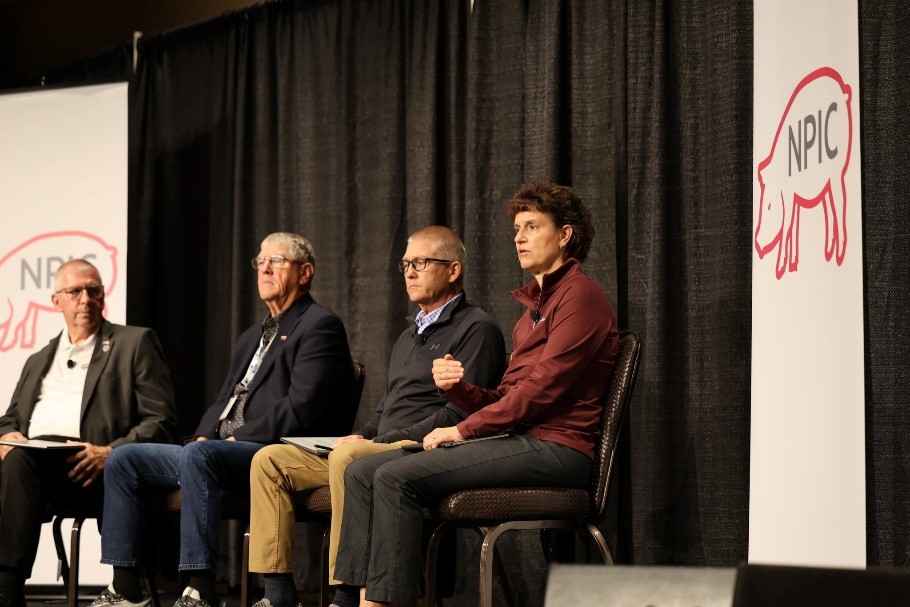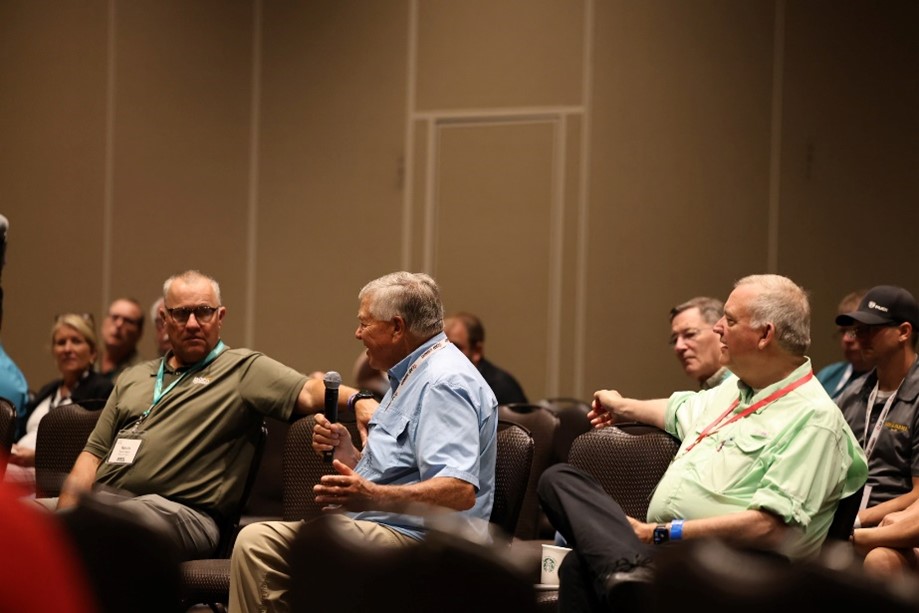Capital Update – For the Week Ending July 18, 2025
In the National Pork Producers Council’s weekly recap: Senate bill funds USDA agencies important to animal agriculture; USTR’s Callahan nominated for chief ag negotiator job; hearing examined role of lab network in protecting agriculture; NPPC supports legislation to boost farmers’ mental health; NPPC highlights policy priorities at 2025 National Pork Industry Conference; and House to hold hearing on California Proposition 12. Take a deeper dive below.
Listen to the Capital Update Here!
Senate Bill Funds USDA Agencies Important to Animal Agriculture
What happened: The Senate Committee on Appropriations recently approved on a 27-0 vote its fiscal 2026 “Agriculture, Rural Development, Food and Drug Administration, and Related Agencies Appropriations Act” to help rural America, support farmers and ranchers, secure the food supply, and maintain nutritional support for low-income families.
The bill provides $27.1 billion in discretionary spending, including funds for the following U.S. Department of Agriculture agencies important to animal agriculture:
- $3.6 billion for agricultural research programs, including $1.9 billion for the Agricultural Research Service and $1.7 billion for the National Institute of Food and Agriculture. It fully funds the National Bio and Agro-Defense Facility to protect animal agriculture from foreign animal diseases.
- $1.2 billion for the Animal and Plant Health Inspection Service to help protect animal and plant resources from diseases and pests. It also provides funds to assist ranchers with the cost of electronic identification tags to comply with animal disease traceability requirements.
- $223 million for the Agricultural Marketing Services to market U.S. agricultural products domestically and internationally, support domestic commodity purchase programs, and provide market data to help producers make informed business decisions.
- $1.2 billion for the Food Safety and Inspection Service to promote the safety and productivity of the $186 billion meat and poultry industry by supporting nearly 8,000 inspection personnel for meat, poultry, and egg products at more than 6,800 facilities.
NPPC’s take: NPPC supports the bill’s increases in funding for various USDA programs, particularly ones that benefit animal agriculture.
Why it matters: The annual agriculture appropriations law funds federal programs that support farmers, including farm loans, agricultural research, and ones related to protecting swine health and preventing and preparing for foreign animal diseases. The bill will now be considered by the full U.S. Senate.
USTR’s Callahan Nominated for Chief Ag Negotiator Job
What happened: President Trump nominated Julie Callahan to be the chief agricultural negotiator in the Office of the U.S. Trade Representative. Her nomination must be approved by the Senate Finance Committee before going to the full Senate for a confirmation vote.
Callahan currently is the assistant U.S. Trade Representative for Agricultural Affairs and Commodity Policy, overseeing USTR’s efforts to promote the interests of U.S. farmers, ranchers, and food manufacturers. She previously served as a deputy assistant USTR and senior director in the USTR Agriculture Office.
Prior to joining USTR in 2016, Callahan held senior leadership positions at the U.S. Food and Drug Administration and worked in the U.S. Department of Agriculture’s Foreign Agricultural Service. She also worked for the American Chemical Society.
NPPC’s take: NPPC has pushed the administration to fill the chief agricultural negotiator position, which is especially critical to American agriculture given ongoing reciprocal trade negotiations.
Noting her experience at USTR developing agricultural trade policy, working to reduce tariff and non-tariff barriers to U.S. agricultural exports, and negotiating and implementing free trade agreements, NPPC congratulates and strongly supports Callahan for the USTR position.
“Exceptionally familiar with agriculture and science-based standards, Julie has also been actively engaged with trade negotiations in the Trump administration and is in a unique position to advocate for U.S. agriculture on the world’s stage,” said NPPC CEO Bryan Humphreys.
Why it matters: The USTR chief agricultural negotiator represents the interests of America’s farmers and ranchers and the U.S. government in trade talks with foreign nations, working to reduce trade barriers, open new markets, and eliminate unfair trade practices.
Hearing Examined Role of Lab Network in Protecting Agriculture
What happened: The House Committee on Agriculture’s Subcommittee on Livestock, Dairy, and Poultry held a hearing on the role of the National Animal Health Laboratory Network in safeguarding U.S. agriculture.
The NAHLN, part of the U.S. Department of Agriculture’s Animal and Plant Health Inspection Service, helps prevent, prepare for, and respond to foreign animal diseases. It works in partnership with APHIS’s National Animal Vaccine and Veterinary Countermeasures Bank and the National Animal Disease Preparedness and Response Program, as well the National Veterinary Stockpile, to bolster the country’s abilities to respond to animal health emergencies.
NPPC’s take: NPPC strongly supports the NAHLN, part of the “three-legged stool” of USDA programs that help protect the American food supply by preventing, preparing for, and responding to foreign animal diseases. The NAHLN network, along with the National Veterinary Services Laboratories, will be critical for a timely and effective response to foreign animal disease outbreaks, as has been the case for highly pathogenic avian influenza and will be the case for other diseases.
Why it matters: The three-legged stool programs provide stability for producers and veterinarians when faced with challenges from foreign animal diseases, such as African swine fever, Classical swine fever, and foot-and-mouth disease, which have the potential to disrupt our food supply. These programs were funded in the recently signed into law “One Big, Beautiful Bill” Act.
NPPC Supports Legislation to Boost Farmers’ Mental Health
What happened: Representatives Randy Feenstra (R-IA) and Angie Craig (D-MN) introduced legislation to help address a mental health crisis among farmers.
The “Farmers First Act of 2025” would revise and extend through fiscal 2028 the Farm and Ranch Stress Assistance Network, a U.S. Department of Agriculture program providing competitive grants to states, Indian tribes, and qualified nonprofit organizations to provide stress assistance programs, such as professional agricultural behavioral health counseling, helplines, and resources, to individuals engaged in farming, ranching, and agriculture-related occupations. Grant funding for farm telephone helplines and websites may also be used for crisis lines.
According to researchers at the University of Georgia, farmers have suicide rates much higher than the general population, with elevated mental health symptoms and high stress levels. Exacerbating the crisis: Farmers are hard to reach because of their occupational demands and a culture in rural communities where conversations about mental health often have a stigma.
Senators Tammy Baldwin (D-WI) and Joni Ernst (R-IA) also introduced companion legislation.
NPPC’s take: NPPC supports efforts to address the mental health crisis among farmers.
“As farmers and ranchers, we face unique stressors that are often beyond our control,” said NPPC President Duane Stateler, a pork producer from Ohio. “By prioritizing these [mental health] resources, we can strengthen the resilience of rural communities and ensure long-term support for both producers today and future generations.”
NPPC Highlights Policy Priorities at 2025 National Pork Industry Conference
What happened: Pork producers, NPPC officers and staff, and representatives of allied industries across the value chain gathered at the Kalahari Resort in Wisconsin Dells, WI, to participate in the 29th annual National Pork Industry Conference. Attendees participated in various seminars on animal diseases, pork promotion and consumer trends, swine research, sow productivity, “smart barn” technology, and policy topics.
NPPC President and Ohio pork producer Duane Stateler, President-elect and Iowa pork producer Rob Brenneman, Vice President and Ohio pork producer Pat Hord, and immediate past president and Minnesota pork producer Lori Stevermer were featured in a policy update panel.
NPPC CEO Bryan Humphreys joined National Pork Board interim CEO Alex Wibholm for a fireside discussion on the roles each organization plays, including how they work together to strengthen the pork industry and expand markets for U.S. pork exports. The group also heard from Nebraska Governor Jim Pillen, a former pork producer, about the legislative, regulatory, and political landscape shaping animal agriculture.
Why it matters: Industry conferences such as NPIC serve as a platform for participants like NPPC to raise awareness and educate pork industry stakeholders about the current public policy issues and challenges facing pork producers and how they can get involved.

Left to right: NPPC President and Ohio pork producer Duane Stateler, President-elect and Iowa pork producer Rob Brenneman, Vice President and Ohio pork producer Pat Hord, and immediate past President and Minnesota pork producer Lori Stevermer discuss policy challenges within the industry.
NPPC past president Dr. Howard Hill participates in an audience discussion at NPIC.

Look Ahead: House Hearing on California Proposition 12
What: The House Agriculture Committee on July 23 will hold a hearing on the ramifications of California Proposition 12, which bans in California the sale of uncooked whole pork from hogs born to sows raised in housing that does not meet the state’s arbitrary standards.
NPPC is asking congressional lawmakers to fix the problems caused by Proposition 12, which has the practical effect of regulating pork production practices outside California’s borders.
Click here to watch the hearing.